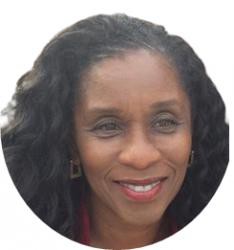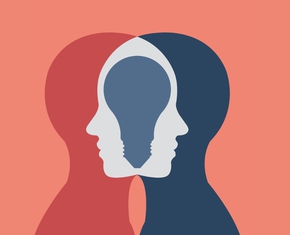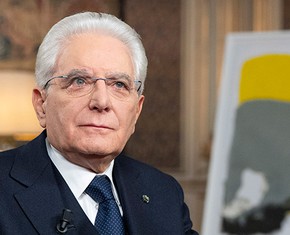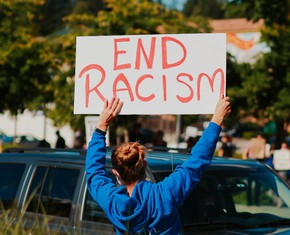The views expressed in our content reflect individual perspectives and do not represent the authoritative views of the Baha'i Faith.
Many Americans are wondering, “What should happen next?” following the murder conviction of Minneapolis police officer Derek Chauvin in the killing of George Floyd. Most Americans believe the verdict has meaning, but they differ on just what that meaning is.
RELATED: How Baha’is Responded After George Floyd’s Death
I’ve kept in mind what Baha’u’llah, the prophet and founder of the Baha’i Faith, said: “The heaven of divine wisdom is illumined with the two luminaries of consultation and compassion and the canopy of world order is upraised upon the two pillars of reward and punishment.”
The Universal House of Justice, the international governing body of the Baha’i Faith, noted in 2017 that in the United States in recent years, “Matters of moral principle and questions of justice are reduced to intractable liberal or conservative viewpoints, and the country is increasingly divided along divergent lines.” The reaction to the conviction of Derek Chauvin for the murder of George Floyd is a case in point.
If we get all our news from sources that agree with our views, we reinforce the division the House of Justice is talking about. But following George Floyd’s death in May 2020, the House of Justice wrote that the attention being focused on racial justice was “creating possibilities for marked social change.”
I believe the opportunity for change lies not only in efforts to reform the police system or address systemic racism in law enforcement and a culture of violence against people of color. The opportunity for change might, more importantly, be found, as the Universal House of Justice explains, in the “profound alteration of thought and action” required from all Americans to find a common path forward to understanding the oneness of humanity, the ultimate goal of the Baha’i Faith. Baha’i consultation provides a way.
Moving Away From Conflictive Conversation
In a 2020 letter, the Universal House of Justice wrote that rather than being “drawn into the ultimately futile conflict and strife that characterizes so much of the discussion of the affairs of society,” we should instead seek “to discover that precious point of unity where contrasting perspectives overlap and around which contending peoples can coalesce.”
Helping Americans find “that precious point of unity” is the contribution I hope we can all make to the discourse on what comes next, following the rare conviction of a police officer for the fatal use of excessive force.
Baha’u’llah, the founder of our Faith, said with respect to establishing world peace that a time would come for “the holding of a vast, an all-embracing assemblage” to find solutions to the problems hampering peace. Perhaps we are not yet ready for a worldwide consultation on world peace, but after all that has happened, the United States might be primed for a nation-embracing discussion on the role of policing in our society, using the principles of Baha’i consultation as a guide.
As the Universal House of Justice wrote, “It is not possible … to effect the transformation envisioned by Bahá’u’lláh merely by adopting the perspectives, practices, concepts, criticisms, and language of contemporary society.” If such a nationwide discussion is to be held, it will have to be conducted with attitudes different from those we have seen expressed in our news and social media outlets.
The Universal House of Justice points out in another letter that on this and so many issues: “There has been a hardening of viewpoints, increased incivility, an unwillingness to compromise or even entertain differing perspectives, and a tendency to automatically take sides and fight.” We need another path that will allow us to use this moment in history to propel us forward together in our quest for social justice.
Adopting the Baha’i Concept of Consultation
Baha’is believe that justice and unity will prevail when we engage in “simultaneously building an ideal society and perfecting the behavior of individuals,” as the Universal House of Justice said in a 1999 letter. When we use Baha’i consultation to find answers to societal problems, we do both.
RELATED: Is Promoting Racial Unity a Spiritual Responsibility?
This is not easy. There are prerequisites and principles that those involved in consultation must work to observe for the process to produce the kind of results that will change themselves and society. Among them are these:
- pure motives
- detachment
- humility
- courtesy
- dignity
- patience and long-suffering
- free expression of opinions
- putting aside hurt feelings when views are opposed
- care and moderation in expressing ideas
- not belittling the suggestions of others
Many of us come to discussions with what we believe to be the truth in hand. Our objective is to persuade others to see that truth. This only produces conflict, and conflict will never bring enduring change.
Consultation removes the elements of dispute and insistent ways of expressing ideas. We no longer try to convince others of something. We engage in a unifying process. Attempting to achieve an agreement on what to do next through a process characterized by friction and coercion leads only to a superficial pseudo-unity. It may establish an agreement of some kind, but it does not achieve any fundamental synthesis of thoughts and ideas that all feel a part of. There is not the spiritual growth that comes from practicing detachment, humility, courtesy, etc. We may get a material agreement, but not a spiritual one.
Only through Baha’i consultation can we “discover that precious point of unity where contrasting perspectives overlap and around which contending peoples can coalesce.”
For Baha’is, truth is found only after we have had the benefit of considering the thoughts, opinions, and views of others. Few of us really believe there is only one right answer and that we have somehow found it when all others have failed to do so. Consultation helps us normalize the limitations of our own understanding and the fallibility of our own opinions so that we can benefit from the contributions of others. In one sense, using consultation can be liberating because the burden of addressing problems becomes a shared burden.
RELATED: How to Build a Strong Nation with Consultation
Baha’u’llah tells us, “… no man can attain his true station except through his justice. No power can exist except through unity. No welfare and no well-being can be attained except through consultation.”
Finding Justice Through Consultation
Baha’is recognize the need for justice if our society is to protect the rights of all people and allow them to prosper, but the Universal House of Justice says that for individuals to be able to contribute to the advancement of society, “justice is indeed essential to resist the vain imaginings and idle fancies of social and political machinations, to see reality with one’s own eyes, and to identify the requirements for an equitable social order. But then unity is essential — forged through consultative processes, including action and reflection — to achieve the power required for positive social change.”
The watchword of the Baha’i Faith is “unity in diversity.” Consultation does not require that those involved compromise with their views, but it does ask us to understand that human diversity means there is, of necessity, a divergence of thoughts, opinions, understandings, and sentiments. Our appreciation for diversity means we must respect the views of others even though we disagree with them. This divergence is not a sign of “wrongness” or “rightness.” It is a sign that we have not yet engaged in a process that allows us to find where the various views coincide.
As Abdu’l-Baha, the leader of the Baha’i Faith following the death of his father, prophet and founder Baha’u’llah, explained, “… consultation must have for its object the investigation of truth. He who expresses an opinion should not voice it as correct and right but set it forth as a contribution to the consensus of opinion; for the light of reality becomes apparent when two opinions coincide. A spark is produced when flint and steel come together.”
Baha’is believe humanity is on an evolutionary journey, the ultimate aim of which is unity — a unity that will produce a peaceful, harmonious society that nurtures all its peoples. Conducting our lives and our society with the benefit of consultation puts us on a higher plane of social and cultural development towards that evolutionary destination.
Using consultation to solve problems is a sign of the “maturity of the gift of understanding” or intellect, and the “power of the intellect is one of God’s greatest gifts” to human beings.
Some of those involved in racial justice issues say that very little has changed in the struggle for justice for African Americans over the last 100 years or so, despite the achievements of the civil rights movement. I believe that those who make this claim understand that positive legal and social changes have taken place, but what they are sensing is the lack of real unity. That kind of unity can only come about, Baha’is believe, when consultation is part of the process.
The lack of true racial justice is only one of the many terrible perils in our world that can no longer be ignored. As this unifying process gains momentum, as people learn through experience the benefits of consultation, as they participate in this idea highlighted in the Baha’i teachings, problems will be overcome, and humanity will be on the road to the total restructuring of human society.
















Comments
Sign in or create an account
Continue with Googleor